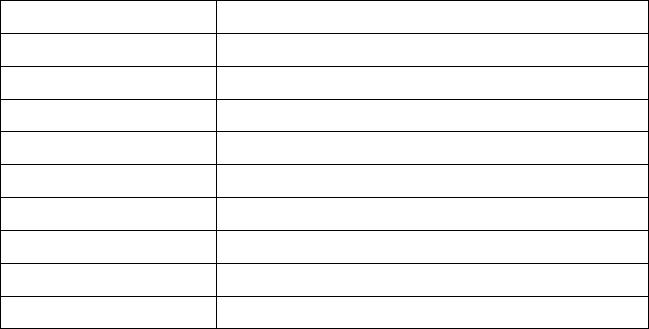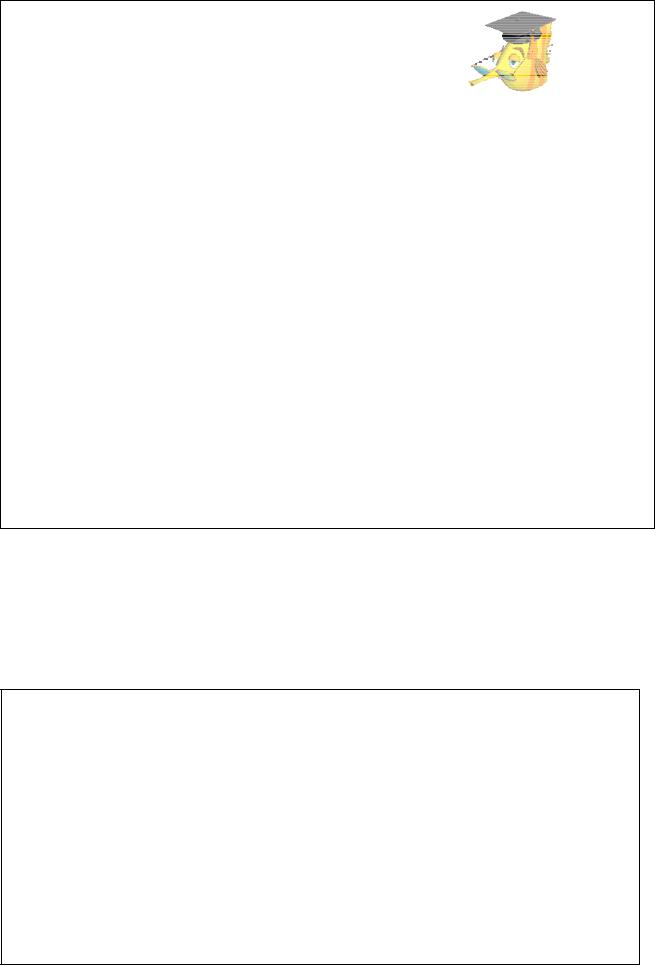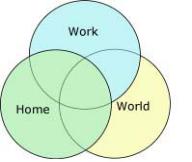
ENGLISH for Study and Work том 1
.pdf
Figure / Configuration |
Name |
Form / Shape |
||||
|
|
|
|
|
|
|
1. |
|
|
|
|
a) an oval/ ellipse |
|
|
|
|
|
|
||
|
|
|
|
|
|
|
|
|
|
|
|
|
|
2. |
|
|
|
|
b) an arrow |
|
|
|
|
|
|
||
|
|
|
|
|
|
|
|
|
|
|
|
|
|
|
|
|
|
|
|
|
|
|
|
|
|
c) a circle |
|
3. |
|
|
|
|
|
|
|
|
|
|
|
|
|
4. |
|
|
|
|
d) a square |
|
|
|
|
|
|
|
|
|
|
|
|
|
e) a triangle |
|
5. |
|
|
|
|
|
|
|
|
|
|
|
|
|
6. |
|
|
|
|
f) a curve |
|
|
|
|
|
|
|
|
|
|
|
|
|
g) a rectangle |
|
7. |
|
|
|
|
|
|
|
|
|
|
|
|
|
8. |
|
|
|
|
h) a cube |
|
|
|
|
|
|
|
|
9. |
|
|
|
|
i) a cylindre |
|
|
|
|
|
|
|
|
10. |
|
|
|
|
j) a line |
|
|
|
|
|
|
|
|
4039

6.Fill in the last column on the right with the adjective describing the form of an object.
Example: a circle – circular, round
7.Read the following table, then listen to the dialogue and tick (√) the information you have heard. Compare the results of your work with a partner.
Table 1.2
Height |
quite tall |
|
medium |
|
rather short |
|
|
|
|
|
|
|
|
Build |
stout |
|
well-built |
|
thin |
|
|
|
|
|
|
|
|
Age |
middle-aged |
|
old |
|
teenaged |
|
|
|
|
|
|
|
|
Facial |
oval face |
|
round face |
|
high |
|
Features |
|
|
|
|
cheekbones |
|
|
|
|
|
|
|
|
Eyes |
blue |
|
green |
|
hazel |
|
|
|
|
|
|
|
|
Hair |
long loosed |
|
curly |
|
short cut |
|
|
|
|
|
|
|
|
Hair Colour |
blond |
|
red |
|
brown |
|
|
|
|
|
|
|
|
Personality |
kind |
|
cheerful |
|
outgoing |
|
|
|
|
|
|
|
|
Clothes |
formal |
|
casual |
|
stylish |
|
|
|
|
|
|
|
|
8. Fill in the WORKSHEET below with the words from the list given in the box. If necessary, use the dictionary.
Round, oval, of medium height, middle-aged, teenaged, old, blond, tall, wrinkled, bold, tanned, slim, thin, scar, well-built, overweight, pale, muscular, straight, skinny, braid, crooked, short, moustache, beard, pony-tail, longlegged, curved, wavy, short, full, beautiful, handsome, ugly, dark, fair, hazel, blue, grey, green, red, brown, fat, plump, silver, pretty, broad-shouldered, turned-up, full, stout.
410

WORKSHEET 1.1
HEIGHT:
BUILD:
AGE:
COMPLEXION:
FACE:
HAIR:
EYES:
NOSE:
LIPS:
SPECIAL FEATURES:
9. Describe anyone from your group following the given scheme. Make notes if necessary.
Introduction: |
Name of the person; time you met/saw him/her first |
|
|
Main Body: |
Physical appearance: height/build, age, facial features, |
|
hair, clothes. |
|
Personality characteristics. |
|
Hobbies, interests or any activities s/he takes part in. |
|
|
Conclusion: |
Eg. All in all, |
|
Ultimately, etc. |
|
|
Comments: |
Comments and feelings about the person. |
|
|
421

 Grammar Reference:
Grammar Reference:
Adjectives, Possessive Case of Nouns and Personal Pronouns.
Simulation
Situation. Imagine that you are going abroad to participate in a conference. Be ready to give an oral description of yourself.
Prepare yourself by:
•describing your appearance
•describing clothes you will be wearing.
Follow-up
10.Write a letter to your friend describing your new university friend. Follow the schemes and tables given in the Unit.
11.1 Write down as many adjectives describing personal qualities as you know. You may use a dictionary if necessary.
11.2 Classify them into three main groups: Positive Qualities (+), Negative Qualities (-) and Neutral Qualities (±).
 Self-awareness
Self-awareness
11.3 Put the ticks (√) near the qualities you possess. Write a short paragraph describing your character. Focus on your positive qualities.
12.Think on whether your negative qualities are really negative, whether it is possible to change them into positive ones.
432
Unit 4 Describing Daily Life and Learning Experience
Focus on
•reading letters
•expressing thoughts, personal opinions and exchanging information in written
•identifying writer’s purpose and appreciating the impact of writing
(e.g. letters and e-mails etc.)
•comprehending different registers: how people talk and write to friends, colleagues, teachers etc.
•writing texts for a variety of purposes related to personal and academic/professional areas
•writing letters, e-mails etc.
•writing clear, detailed descriptions of the events and experiences in the academic and/or vocational life, marking the relationship between ideas and following established conventions of the genre concerned
By the end of the unit you will:
•be able to write e-mails and letters describing your daily life and learning experience
•be able to exchange your personal opinions and information on daily life in oral and in writing
•develop your range of the vocabulary necessary to describe your every day life and your own learning experience
•be aware of the traditions and culture of foreign universities
Start-up
1. Read the information about traditions that exist in foreign universities given in the box below.
443

For You to Know:
First Days in a University
When you arrive to American or English University/College you are provided with the Welcome Pack which typically contains a Welcome letter from your tutor and/or teachers of the courses to be delivered, Welcome Guide for Course Participants (10 – 15 pages in whole) which contains the detailed information for newcomers about UNIVERSITY/ COLLEGE SERVICES: Reception, Catering, Learning Resources Centres, Public Transport, Taxis etc.; ACCOMMODATION: Living on Campus including NON-SMOKING Policy in the most areas of the College/ University, WELFARE: Keeping in Touch with Home, Insurance, Health, FREE TIME: Sports, Shopping, Campus Facilities, SAFETY INSTRUCTIONS for students with the detailed description of safety measures to follow while traveling etc.
The information provided will easify your first days in the University/ College and staying in a foreign country. You will be also provided with the map of University/ College as well as the city it is situated in and its suburbs.
2. Group-work. You are going to read a Welcome letter for the ESP course. The letter was written by the Ukrainian English teachers from the National Mining University. Before reading, try to predict what it will be about by answering the questions from Prediction Chart.
Prediction Chart
What is this letter about?
Why have teachers written this letter? What information can you find in this text? How will the whole text be arranged?
What information would you like to find in this text?
Share your predictions within your group, explaining what helped you to make the predictions.
45

Reading and Speaking
3. Read a Welcome letter for the ESP course written by the National Mining University teachers.
Dear Student,
Welcome to our classes! It’s nice to see that you are here and that you wish to study English. We would like to explain to you a little about our classes.
Our classes are going to study English for Specific Purposes of yours. We will study English for academic purposes and/or vocational purposes. It will greatly depend on your needs and wants. In any case while studying we will focus on the situations typical for academic environment and the environment you will find yourself in future. We will discuss topics and issues that are around us, like our families, friends, university, our feelings and how we came to this city and what for. The topics of your professional area and interest are also will be focused on, but a little bit later. We will study issues in English by using our skills in speaking, writing, reading and listening. The special attention will be drawn to study skills or ‘learning to learn’ and raising your selfawareness and organisation.
You have many important roles to play in our class. First, you are a representative of your community and region you have come from. Second, you also will be a researcher of your life and university community as well as a researcher in the field of your specialism area. It is important to learn about yourself as a person and to share your personal experience with your groupmates, i.e. to tell the members of your group what you know and can do using English. Third, we hope that you will feel free to tell our class what you need and want to learn. We also hope that you will report to our class about what you like or do not like about our studying. We promise we will help you to learn by developing different strategies and skills you will need to be a success in future. Fourth, in our class we will study about different topics and issues around us. It will be necessary for us not only study these issues, but also to make an action plan for your future.
Our role will be to provide you with choices. We will give you many options on how to study English, options on what to study and how to study it and make your plans of action. We will help you to learn English and develop both personally and professionally. We will give you feedback on your studying when you want us to do so.
We hope you will see that we are all teachers and learners. We can teach the English language and you can teach us about your specialism area.
If you have any questions, please ask them to us. We enjoy talking to you and answering your questions.
Sincerely Yours,
Teachers of Foreign Languages Department
465
4. Give the answers to the following questions, using the letter given above when necessary.
•What subject will be taught in the classes?
•What are the objectives of the classes? Are any of them appropriate to your needs and wants?
•What are the main roles students have in the classes? Which one of them do you agree and disagree with? Why?
•What is the role of the teacher?
•Why have the teachers written this letter?
•Do you agree or disagree with the role of the teacher? Why?
•Is it a good tradition in English-speaking countries to write Welcome letters to their students?
•Would you like your teacher to write a Welcome letter or a Letter of Explanation? Why?
•Do YOU have any questions to your English teacher? If yes, write them down on a sheet of paper and give them to your teacher at the end of your class.
5.Compare your predictions with the answers you have got after reading a Welcome letter.
6.Draw a format of a letter using a Welcome letter you have read.
Speaking
7. Below is the list of words and phrases used for describing daily routine. Put them into three columns in the correct order using the supporting questions and diagram. Make a story about your daily routine. Try to use as many words from the list as possible.
476

•What do you usually do in the morning?
•What do you usually do in the university/at work?
•How do you spend your spare time?
University
Language to Be Used:
Working hours, to sleep, to dream, to wake up, to get up, to be busy=to work hard, to wash, to dance, break (for lunch/coffee/tea), to take a bath/a shower, to leave, to be free, to take the exam, to brush one’s teeth, to shave, subject (area), credit, canteen, colleague, teacher, to comb one’s hair, to get dressed, lecturer, to have=eat breakfast/lunch/dinner, tuner, to wash up, to deliver lectures, to get handouts, textbook, to take notes, to make notes, note-book, qualified, to be fired, to be hired, to enter, to finish school, to graduate from the university, term, dean, tutor, to get scholarship, to win/get a grant, to earn (money), holidays, leisure, hobbies, interests, radio, TV, channel, programme, quiz, cross-word puzzle, band, to turn up/down (the volume), to play the instrument, to sing, to read, exhibition, museum, show, sports, education, to learn, to take lessons, to have classes, a course, professor, undergraduate, bachelor, master, homework, timetable/schedule, assignment, task, problem, examination, module, result, mark, to pass, to fail, level, to get up early, to travel by bus, to do a lot of preparation, to write reports, to meet parents, to make lots of photocopies, to read a lot of books.
8. Complete the adjectives used when describing one’s daily routine with two opposites/antonyms filling the gaps with the appropriate letters. The first one is done for you.
Adjective |
Opposites |
relaxing |
stressful or tense |
easy |
di_ _ _ _ _ _ _ t or ha_ _ |
leisurely |
hec_ _ _ or cha_ _ _ c |
dangerous |
sa_ _ or se_ _ _ _ |
487
slow |
fa_ _ or q_ _ _ _ k |
similar |
di_ _ _ _ _ _ t or va_ _ _ d |
invigorating |
ti_ _ _ g or ex_ _ _ _ _ _ _ g |
punishing |
rew_ _ _ _ _ g or ful_ _ _ _ _ _ g |
9. Read a description of Student’s daily routine written by a Brazilian student. Fill in the gaps with the correct form of the verbs have or have to in present or past.
Well, the best three adjectives I can think of are hectic and tiring - but also very rewarding. I get extremely tired because I _______work the whole day. A student's life isn't easy in Brazil. We usually ______three or four classes a day. Each class is about 50 minutes long. One scholarship isn't enough, so I work in two different places. I _________rush from one place to another, so I don't get any time to relax. It's better now I can drive and ________a small car, but it was really difficult when I _______go everywhere by bus. I was travelling for up to three hours a day, sitting on buses, preparing my hometask and doing homework. I'm lucky because Thiago _______a good job, so we don't_______work at weekends.
There are more than 30 students in our group, so it's hard to talk to all of them at the university. I enjoy socialising with them at weekends. Then two evenings a week I took classes in driving which were very different but rewarding too. What I love about learning is the interaction with the teachers and students. I ______learnt much since I entered the university. Everyday I
_______lectures in different subjects, laboratory works and seminars. That is why I _______read much to be ready for classes. Preparation for classes takes a lot of time.
10. Pair-work. Exchange your own experience of being a student with your neighbour. Try to use as many new words got from 7 – 9 as possible. Be ready to describe your partner’s student’s daily routine to the whole class.
498
